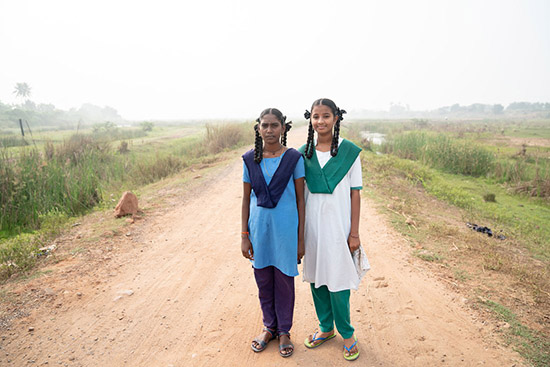谷歌在印度:希望、梦想和机遇
|
无论谷歌能否在印度赚得一分钱利润,在诸如Thotlavalluru这类位于印度农村腹地的村庄,互联网正在切切实实地改变着人们的生活,并在这一过程中改变着印度自身——毕竟,外面的世界终于开始渗透到与世隔绝的偏远地区。一天清晨,在距离Thotlavalluru村几英里远的Pamula Lanka村,我站在甘蔗地之间,一头水牛迈着大步走过。13岁的阿莎·西拉姆和15岁的索尔·武哈正骑着脚踏车,行驶在上学的土路上,辫子在她们身后飞舞。不经意间,她们停在了我面前。“你是美国人吗?”她们跳下自行车,睁大眼睛问道。在这样一个小村庄见到一位外国人,显然让两位小姑娘万分惊奇。
我们之间的谈话很快就转到一件令人兴奋的新事件上:上个月,随着家里购买了一部智能手机,互联网终于抵达阿莎的家中。阿莎说:“我喜欢在WhatsApp上和朋友聊天。”她解释说,她的英语水平足以使用这款即时通讯应用,但她的父母只会说泰卢固语,需要她的帮助才能在线交流。自从她的父母几周前首次上网以来,“他们知道了一些关于村庄和城市的信息,甚至对美国也有所了解。”她惊讶地说。“他们是用谷歌来查找信息的。” |
WHETHER OR NOT GOOGLE makes one rupee of profit in India, it is in villages like Thotlavalluru, deep in rural India, that the Internet is most transforming lives—and in the process, India itself, as the outside world finally begins to pierce remote, isolated areas. At dawn one morning, in the tiny village of Pamula Lanka, a few miles from Thotlavalluru, I stand amid fields of sugarcane, with buffalo loping by, when Asha Seelam, 13, and Sole Vuha, 15, come pedaling down the dirt path on their way to school, braids bobbing behind them, and skid to a halt in front of me. “Are you American?” they ask with wide eyes, hopping off their bikes in wonder at the sight of a foreigner in their tiny village.
The conversation quickly turns to an exciting new event: The arrival of the Internet at Asha’s home the previous month, with the family’s purchase of its first smartphone. “I like to chat with my friends on WhatsApp,” Asha says, explaining that she knows enough English to use the messaging app, but that her parents, who speak only the local Telugu language, need her help to communicate online. Since her parents had first logged on to the Internet a few weeks earlier, “they know some information about villages and cities, even in America,” she says with amazement. “They use Google to find information.” |

|
那天下午,当我来到她家的小房子时,她的母亲、36岁的西拉姆·文卡特斯瓦拉姆玛告诉我,她用谷歌地图查看到印度教圣地的距离。自从去年 11 月上网以来,让她最激动的事情莫过于在YouTube上观看了一部用泰卢固语拍摄的印度电影。其主演是当地的万人迷维贾伊·德维拉孔达。
阿莎的父亲是一个农民,全家的年收入仅有区区800美元,这样一家人对谷歌没有任何商业价值。但请忘记这个事实吧。现在,这家人正在登陆免费网站,而不是在网上挑选度假计划或购买衣服——未来几年或许依然是这样。但对谷歌和其他科技公司来说,像阿莎这样的家庭恰恰是印度互联网图景的生动写照。他们认为,这个市场是如此独特,如此庞大,值得用尽一切努力来挖掘它的潜力。(财富中文网)
本文另一版本登载于2019年3月刊的《财富》杂志,题目是《谷歌在印度的希望与梦想》。 译者:任文科 |
When I visit her small home that afternoon, her mother, Seelam Venkateswaramma, 36, who teaches in the one-room village schoolhouse, tells me she uses Google Maps to check distances to Hindu pilgrimage sites. Her greatest thrill since getting connected in November has been watching an Indian movie on YouTube, in Telugu, starring local heartthrob Vijay Deverakonda.
Forget the fact that Asha’s father, a farmer, and her mother together earn $800 a year and present no commercial value to Google. For now—and perhaps for years to come—the family is logging on to free sites, not shopping for vacations or clothes. But to Google and other tech companies, families like Asha’s are living proof of a phenomenon that they believe is so unique and so big that it merits trying all means possible to seize its potential.
A version of this article appears in the March 2019 issue of Fortune with the headline “Google’s Hopes and Dreams in India.” |













